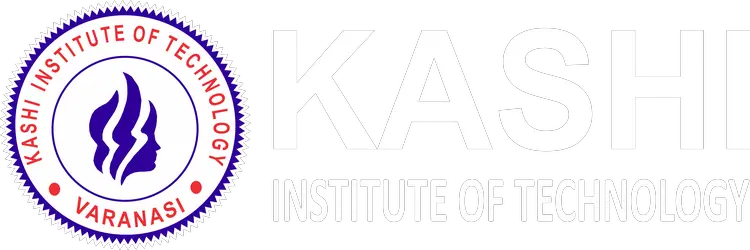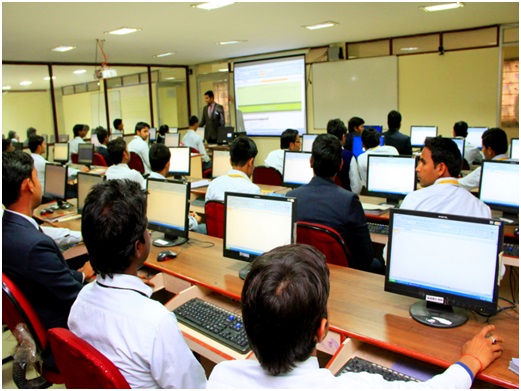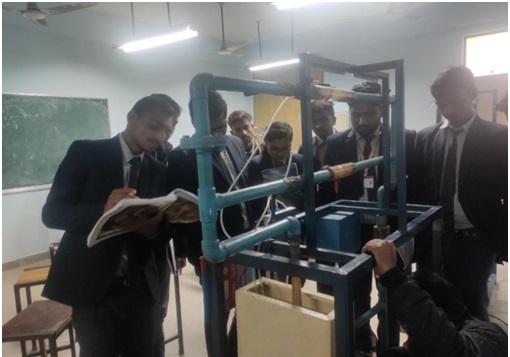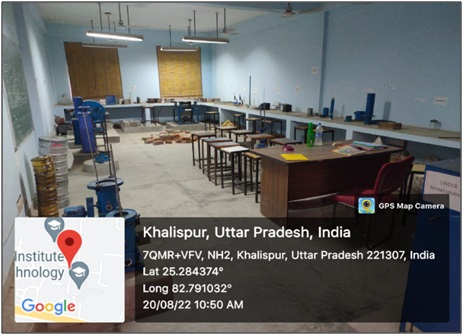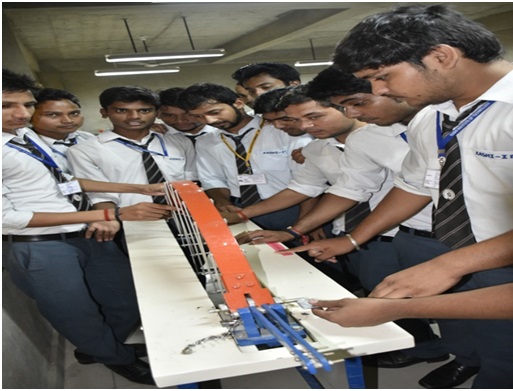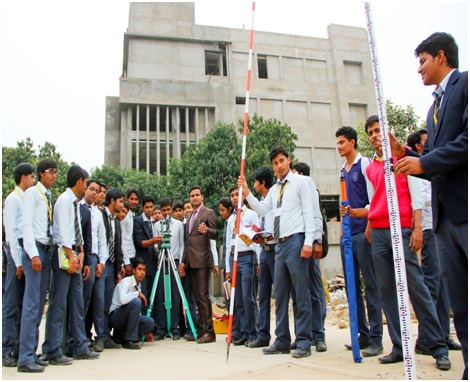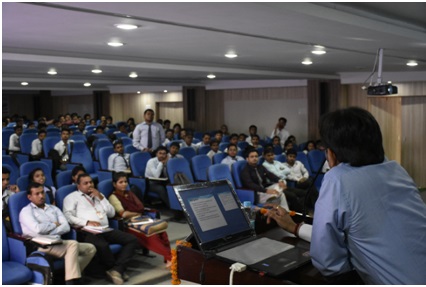Civil Engineering
10+2 (Maths)
4 Years Full Time
Branch Code
CE
Available
hodcivil@kashiit.ac.in
OVERVIEW

Department of Civil Engineering
Civil engineering is the application of physical and scientific principles for solving the problems of
society and improving human life. Being an extensive profession, Civil Engineering includes several specialized sub-disciplines. Its history is linked to the knowledge of structures, material science, geography, geology, soils, hydrology, environment, mechanics and other fields. Owing to the tremendous growth in the infrastructure sector in India and abroad, the demand of Civil Engineers has been on the rise.
To fulfill the growing demands and to cater to the engineering needs of the nation, the institute offers B. Tech degree course & Polytechnic course in Civil Engineering, a four year engineering degree program & a three year engineering diploma program. Civil Engineering is the undergraduate program focused on rigorous analytical study along with realistic practical solutions.
The department has strong presence of qualified faculty with IIT and NIT background and well
equipped laboratories. The major focus is on education for application of IT and latest software in
design and execution of small to large and complex nature of civil engineering projects along with the gain from practical experience from the field studies of different structures. Building, Industries (real estate’s), Bridges, Highways, Flyovers, Dams and Irrigation Structures are top priorities of the academic program.
Department of Civil Engineering
Vision
To produce a new generation of Civil Engineering by providing state-of-the-art education in Civil Engineering recognized worldwide for excellence. This would be guide by extensive practical work in technology and management for industrial and social needs for sustainable development.
Mission
Our endeavor is to make the department the highest seat of learning, prepare Engineering equipped with strong conceptual Foundation coupled with practical insight to meet global business changes.
PROGRAM EDUCATIONAL OBJECTIVES (PEOs):
PEO1 – PROFICIENT DEVELOPMENT
To develop in the students the capacity to obtain knowledge on Mathematics, Science and Engineering and apply it expertly inside sensible requirements, for example, financial, natural, social, political, moral, wellbeing and security, manufacturability and manageability with due moral obligation.
PEO2-CORE PROFICIENCY
To provide ability to recognize, plan, appreciate formulate, comprehend, analyze, design and solve engineering problems with hands on experience in different advancement involving modern tools necessary for engineering practice to fulfill the necessities of society and the business.
PEO3 – SPECIALISED ACHIEVEMENT
To furnished the students with the capacity to explore, reenact, design, simulate, experiment, analyze, optimize and interpret in their core applications through multi disciplinary ideas and contemporary figuring out how to incorporate them into industry prepared graduates.
.PEO4 – PROFESSIONALISM
To provide training, exposure and awareness on importance of soft skills for better career and holistic personality development as well as professional attitude towards ethical issues, team work, responsibility, accountability, multidisciplinary approach and capability to relate engineering issues to broader social context.
PEO5 – LEARNING ENVIRONMENT
To furnish students with an academic environment and make them mindful of greatness, foster the desire of revelation, imagination, creativity, authority, composed moral codes and rules and the long lasting figuring out how to turn into an effective expert in Civil Engineering.
PROGRAM OUTCOMES (POs)
PO1: Engineering Knowledge
Apply the knowledge of mathematics, Science, Engineering fundamentals and an Engineering specialization to the solution of complex engineering problems.
PO2: Problems Analysis
Identity, formulates, review research literature and analyze Complex engineering problems reaching substantiated conclusions using first principles of mathematics, natural Sciences and Engineering Sciences.
PO3: Design /Development of Solutions
Design solution for Complex engineering problems and design system components are processes that meet the specified needs with appropriate consideration for the public health and safety and the cultural societal and environmental considerations.
PO4: Conduct investigations of Complex Problem
Use research based knowledge and research methods including design of experiments, analysis and interpretation of data and synthesis of the information to provide valid conclusions.
PO5: Modern Tool Usage
Create, select and apply appropriate techniques, resources and modern engineering and IT tools including prediction and modeling to complex engineering activities with an understanding of the limitations.
PO6: The Engineer and Society
Apply reasoning informed by the contextual knowledge to access societal, health, safety, legal and cultural issues and the consequent responsibilities relevant to the professional engineering practice.
PO7: Environment and Sustainability
Understand the impact of the professional Engineering solutions in social and environmental contexts and demonstrate the knowledge need for sustainable development
PO8: Ethics
Apply ethical principles and commit to professional ethics and responsibilities and norms of the engineering practices.
PO9: Individual and Team Work
Function, effectively as an individual and as a member or leader in diverse teams in multidisciplinary settings.
PO10: Communication
Communicate effectively on complex engineering activities with the engineering community and with society at large, such as being able to comprehend and write effective reports and design documentation make effective presentation and give and receive clear instructions.
PO11: Project Management and Finance
Demonstrate knowledge and understanding of Engineering and Management principles and apply these to one’s own work, as a member and leader in a team to manage projects and in multidisciplinary environments.
PO12: Life -long Learning
Recognize the need for, and have the preparation and ability to engage in independent and life -long learning in the broadest context of technological changes.
PROGRAM SPECIFIC OUTCOMES (PSOs):
The graduates of the department will attain:
PSO1: Problem solving skills (Foundation of mathematical concept) The ability to analyze, design and implement application specific electronic system for complex engineering problems for analog, digital domain, communications and signal processing applications by applying the knowledge of basic sciences, engineering mathematics and engineering fundamentals.
PSO2: Professional skill (Foundation of Computer System) The ability to adapt for rapid changes in tools and technology with an understanding of Societal and Ecological issues relevant to professional engineering practices through life-long learning.
PSO3: Successful career (Foundation of Software Development) Excellent adaptability to function in multi-disciplinary work environment, good interpersonal skills as a leader in a team in appreciation of professional Ethics and Societal responsibilities.
| Name of Member | Designation |
|---|---|
| Mr. Pankaj Kumar Singh | Head of Dept. |
| All Faculties | Faculty Member |
| Mr. Vishal Kumar Poddar Assistant Professor, Department of Civil Engineering, LPU, Jalandhar | Subject Expert |
| Mr. Naveen Kumar Assistant Professor, Department of Civil Engineering, NITTTR, Chandigarh | Subject Expert |
| Vacant | Expert |
| Mr. Ravi Kumar Verma CEO, Saroj Construction Pvt. Ltd., Varanasi, Uttar Pradesh | Industrialist |
| Mr. Durgesh Kumar Maurya (Roll No. 2104280009002) Civil Engineering, Batch : 2020-24 | College Alumni |
Hod’s Message

MR. PANKAJ SINGH
(HOD)
Civil engineering is the oldest and broadest branch of engineering. It focuses on the area of development of infrastructure, buildings, railways, transportation, tunnels, bridges, industrial plants, waterways, airways, transmission towers, etc. that define its broad scope and opportunity in the field of engineering.
Department of Civil Engineering in Kashi Institute was established in the year 2012 and within a short period of time, it has achieved leading dimensions in many areas of Academics, Research & Development, Sports, cultural activities, etc. The department has set up a great tradition of producing eminent engineers who are competent and committed to the high professional standards in the field of engineering and technology. Civil Engineering is the most Versatile and Core branch of Engineering comprising of structural Design & Analysis, surveying, geotechnical, irrigation, transportation etc. Increasing Competition and Complex Technological Breakthrough has widened the scope of Civil Engineering Branch. This is basic to any kind of construction as industrial, commercial, residential in general. Civil Engineering finds wide applications in all fields of technology. The Department is well equipped with full-fledged laboratories & state of art infrastructure facilities supported by a team of extremely dedicated, well qualified and experienced faculty members. Industrial visits, dam site visits, visit to water and wastewater treatment plants form an integral part of their UG program.
Forum activities such as model making competitions are held annually. Guest lecturers are arranged regularly by inviting experts from Industries as well as academics, with special emphasis on industry-institute interaction
.
| COURSE | INTAKE |
| B. TECH. (Civil Engineering) | 30 |
